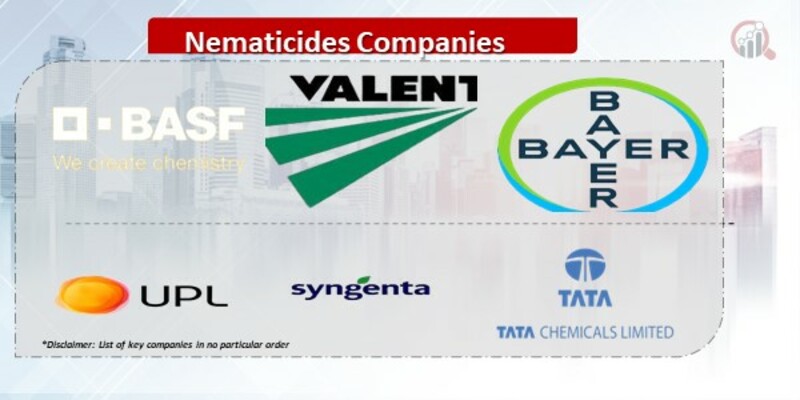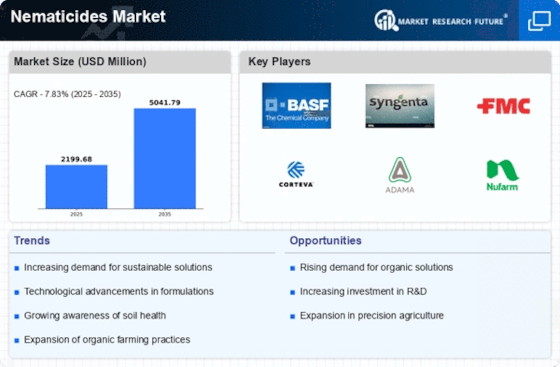Top Industry Leaders in the Nematicides Market

Global Nematicides Market Research Report
The Nematicides Market is characterized by a competitive landscape fueled by the increasing demand for effective solutions to control nematode infestations in agriculture. These industry leaders dominate the market with their comprehensive product portfolios, substantial research and development capabilities, and extensive global reach. The competition in the nematicides sector is driven by the imperative to develop environmentally sustainable and efficient solutions that address the challenges posed by nematodes, microscopic worms that can cause significant damage to crop.
Key players in this Nematicides Market Include :
- BASF SE
- Bayer AG
- Syngenta AG
- UPL LTD
- Ishihara Sangyo Kaisha Ltd
- Valent BioSciences LLC
- Simbiose Agrotecnologia Biologica
- Profarm
- American Vanguard Corporation
- Certis
Strategies adopted: by these key players in the Nematicides Market revolve around innovation, strategic partnerships, and acquisitions. Syngenta AG, a major player in the market, focuses on continuous research and development to introduce novel nematicide formulations that offer improved efficacy and environmental sustainability. Bayer Crop Science pursues strategic collaborations, forming partnerships with research institutions and agricultural organizations to bolster its research capabilities and bring innovative solutions to the market. Corteva Agriscience emphasizes the integration of nematicides into its broader portfolio of crop protection products, providing farmers with comprehensive solutions for pest and disease management.
Market Share Analysis in the Nematicides Market considers various factors influencing the adoption of these products. The effectiveness of nematicide formulations, their compatibility with different crops, regulatory compliance, and pricing strategies play pivotal roles in determining market share. Companies that invest in developing nematicides with reduced environmental impact and minimal harm to non-target organisms are gaining traction in the market. Additionally, strong marketing and educational initiatives to create awareness about the benefits of specific nematicide products contribute to brand loyalty and market share growth.
While the Nematicides Market is currently dominated by established players, the landscape is dynamic with the emergence of new and innovative companies. These emerging players often focus on developing bio-based nematicides, leveraging microbial and botanical solutions to control nematode populations. With a focus on sustainability and reduced ecological impact, these companies aim to disrupt traditional market dynamics. As they gain recognition and market share, established players may face increased competition, prompting them to adapt their strategies to maintain their competitive positions.
Industry news in the Nematicides Market reflects ongoing developments and challenges. The emergence of nematode-resistant crops through biotechnology, advancements in precision agriculture technologies, and the integration of digital tools for targeted nematicide application are key trends. Additionally, there is a growing emphasis on the development of nematicides with longer residual activity, reducing the need for frequent applications and minimizing environmental exposure. The industry is also witnessing increased collaboration between researchers and industry players to address emerging nematode species and tackle issues related to resistance development.
Current Company Investment trends in the Nematicides Market underscore a focus on sustainable practices, digitalization, and research and development. Companies are investing significantly in the development of bio-based nematicides as alternatives to traditional chemical solutions. Digital technologies are being leveraged to enhance precision application methods, allowing farmers to apply nematicides more efficiently and with minimal environmental impact. Moreover, substantial investments in research and development facilities aim to accelerate the discovery of novel active ingredients and formulations with improved efficacy.
Competitive Scenario in the Nematicides Market is marked by a blend of established players defending their market shares and emerging companies introducing innovative solutions. As global agriculture faces the challenges posed by nematode infestations, companies in this sector must navigate evolving regulatory landscapes, changing consumer preferences, and advancements in agricultural technology. A proactive approach to sustainability, research and development, and strategic collaborations will be crucial for companies aiming to thrive in this dynamic and competitive market. The Nematicides Market is poised for growth, driven by the increasing awareness of nematode-related crop losses and the need for sustainable and effective solutions to ensure global food security.
Recent News :
Nematicide News Roundup: Innovation Combats Crop Threat While Prioritizing Sustainability
Corteva's "Reklemel" Revolutionizes Nematode Control: Crop giant Corteva Agriscience is making waves with the recent launch of their flagship nematicide, "Reklemel." This novel active ingredient marks a significant breakthrough in plant-parasitic nematode control, offering several key advantages:
Targeted Action: Reklemel selectively targets harmful nematodes while sparing beneficial soil organisms, promoting a healthier ecosystem.
Reduced Risk: The U.S. EPA granted Reklemel a "Reduced Risk" designation due to its lower use rates and favorable environmental profile compared to traditional nematicides.
Sustainability Champion: Recognized for its minimal environmental impact, Reklemel has the potential to avoid over 500 million kilograms of CO2-equivalent emissions in the next five years.
BioConsortia's Double Threat: Another exciting development comes from BioConsortia, with their forthcoming duo of biological nematicides. These naturally-derived solutions hold promise for effective control of various nematode species across different crops, including corn and wheat. Field trials have shown yield increases of up to 15.8%, highlighting the potential for improved agricultural productivity.
Syngenta Targets Sugarcane: In Brazil, Syngenta has launched "CERTANO," a biological bionematicide specifically tailored for sugarcane cultivation. This multi-functional product boasts nematicidal, biofungicidal, and growth-promoting properties, offering sugarcane farmers a comprehensive solution for improved crop health and yields.

